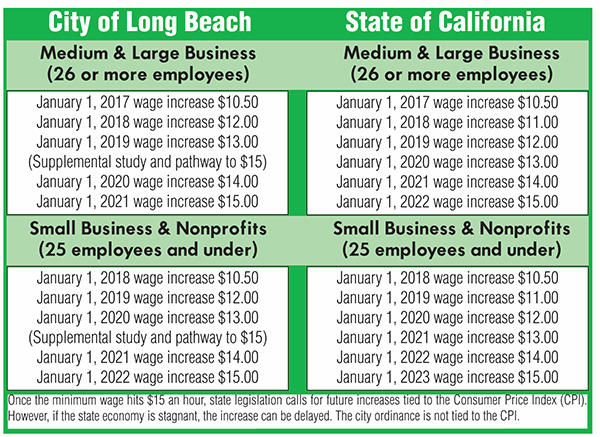At tomorrow’s Long Beach City Council meeting, elected officials plan to vote on which version of the minimum wage law local businesses must follow (see chart below). The Long Beach ordinance requires businesses to pay a higher minimum wage one year faster than does the state law.

The question is, will councilmembers give local businesses a level playing field by using the state law, or penalize them for being located in our city? If they choose the latter, they need to explain why beyond saying “that’s what L.A. and a handful of other cities are doing.”
During the first year, the hourly minimum wage required by both the state law and city ordinance is the same for businesses with 26 or more employees: $10.50 per hour, up from the current $10 per hour, which went into effect this past January 1. Small businesses and nonprofits with 25 or fewer employees are given an extra year to comply.
However, the real impact for smaller businesses and nonprofits hits on January 1, 2019. That’s when the Long Beach ordinance jumps an additional $1.50 per hour – from $10.50 to $12 – while the state law increases by only 50¢ to $11 an hour. That’s a 14.3% jump under Long Beach’s ordinance and only a 4.8% increase under the state law. That’s a significant disparity.
If councilmembers stick with the local ordinance, the result will be that, over a three-year period – from December 31, 2015, when the minimum wage was $9 per hour, to January 1, 2019, when it goes to $12 an hour – Long Beach small businesses will have been hit with a 33.3% increase in the minimum wage. When the cost to match social security (6.2%) and Medicare (1.45%) are added in, plus workers’ compensation costs, which are based on salary, the impact is nearing 45% in three years. That is a job killer.
Keep in mind that businesses with 26 or more employees – nearly all of which are also considered small businesses – will see the same percentage increase a year sooner.
There is little doubt most small and mid-size businesses will not be able to absorb that type of payroll increase. Since most local businesses compete with firms in nearby cities such as Signal Hill, Lakewood, Los Alamitos, Seal Beach, etc., simply raising prices is insufficient. According to small business owners, they will have little choice but to reduce staff and cut work hours.
Some councilmembers, and possibly the mayor, will point out that the city and county of Los Angeles have their own ordinance that also is higher than the state’s. In fact, there are 28 other jurisdictions in California with their own minimum wage ordinances – half of which are similar or higher than Long Beach’s. But there are approximately 460 cities in California that follow the state law.
Another argument to go with the state law is that 75% of the Long Beach workforce does not live in the city. That means most of their paycheck is not spent here, so the city’s ordinance doesn’t benefit the city or a majority of its residents.
Using the Long Beach ordinance is unnecessary and hurtful to our small business community, which makes up 95% of all city businesses. Councilmembers who support the city ordinance should be considered anti-business.
